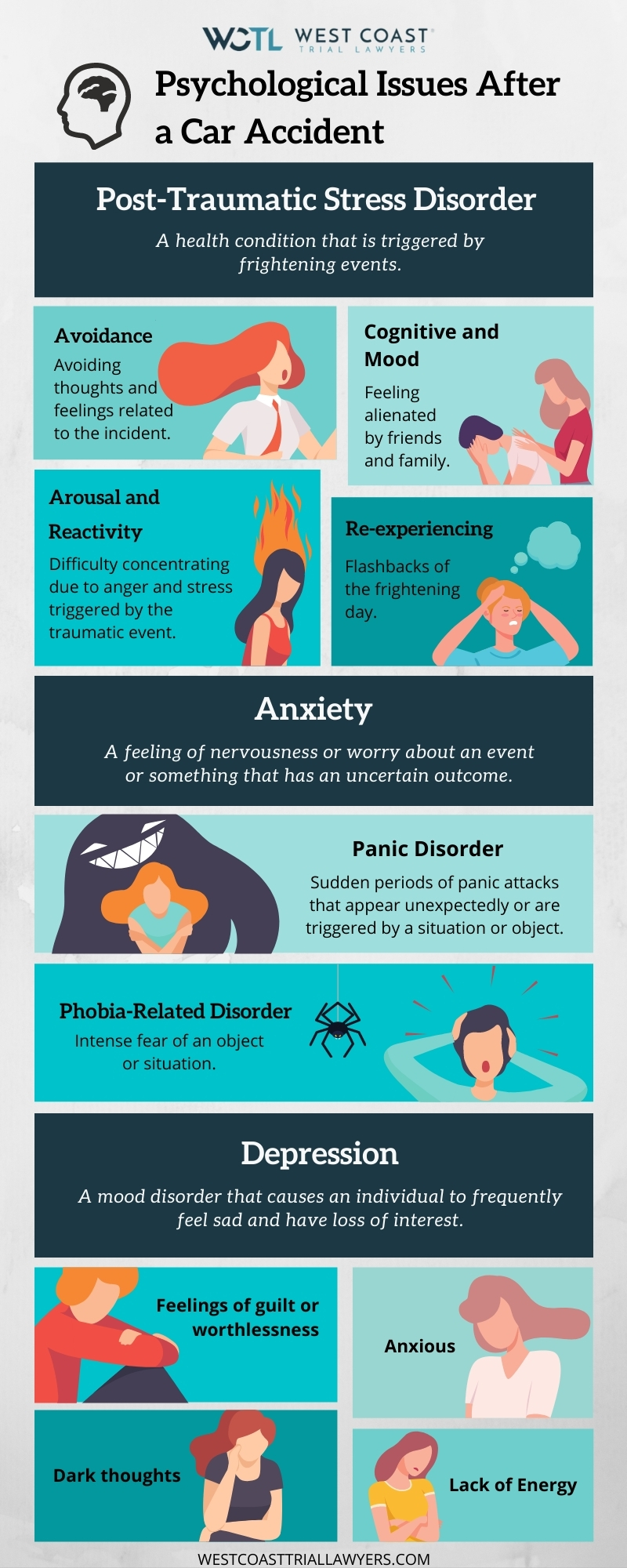
Psychological Injuries After a Car Accident
3 Types of Psychological and Emotional Injuries a Car Accident Can Cause
After a car accident, it’s easy to get wrapped up in physical injuries and property loss. However, an underlying mental health problem may also be possible, especially after going through such a traumatic event. Whether it happens right after an accident or days later, it’s completely normal to experience feelings of shock, fear, and guilt. The real issue arises if these feelings do not go away after a long period of time.
A car accident can easily cause new mental health problems or aggravate existing conditions for victims, and seeing a psychologist or psychiatrist after a crash may be essential to making a full recovery.
Nearly every person will experience a range of reactions after experiencing a car accident, yet most recover from initial symptoms naturally. Those who continue to experience problems may be diagnosed with one of these emotional trauma conditions:
- Post-Traumatic Stress Disorder (PTSD)
- Anxiety
- Depression
If you are a victim of a car accident and are now suffering from PTSD, you may be entitled to acquire compensation for your losses. At West Coast Trial Lawyers, our skilled personal injury attorneys are available 24/7 to offer legal assistance. With our track record of winning more than 5,000 personal injury cases, we are confident that we will deliver a good outcome to your settlement.
To schedule a free consultation, please contact us by calling 213-927-3700 or filling out our quick contact form.

Post-Traumatic Stress Disorder (PTSD)
According to the book After the Crash: Psychological Assessment and Treatment of Survivors of Motor Vehicle Accidents, motor vehicle accidents are the leading cause of post-traumatic stress disorder. Some symptoms directly attributed to a car accident can include an ongoing feeling of uneasiness, anxiety about being in a vehicle, nightmares, or ongoing memories of the accident you can’t stop thinking about.
Post-traumatic stress disorder (PTSD) is a disorder that occurs when an individual experiences a horrifying or dangerous event. Symptoms can occur within three months of the initial date of the accident. It is also possible for PTSD to emerge years after the unfortunate event. In order to identify PTSD, symptoms must last longer than a month, along with drastically affecting an individual’s life.
According to the Journal of Anxiety Disorders, the moment your life is in danger is the strongest predictor for PTSD 6 months after the initial date of the incident. Similarly, the Journal of Consulting and Clinical Psychology found that avoidance behavior, suppression of thoughts, rumination, and dissociation were most strongly connected to PTSD symptoms about 2 to 6 months after an accident.
According to the National Center for PTSD, 7 or 8 out of every 100 people will experience PTSD. Moreover, women are more likely than men to develop PTSD.
Researchers are still unaware of why some people develop PTSD while others do not. What is known, though, is that there are risk factors that contribute to the development of PTSD, which can be from the following:
- Gender
- Childhood trauma
- Experiencing extreme fear
- Coping with a long-lasting traumatic event
- Lack of support from loved ones
- Facing a significant amount of stress due to a variety of causes, such as coping with your injuries or losing a loved one
- History of having mental illness
- Substance abuse
In order to be diagnosed with PTSD, an adult must have all of the following:
- Minimum of one re-experiencing symptom
- Minimum of one avoidance symptom
- Minimum of two cognition and mood symptoms
- Minimum of two arousal and reactivity symptoms
Re-experiencing symptoms can dramatically affect an individual’s personal life. Anything that reminds the individual of the event, including words or objects, can set off re-experiencing symptoms.
Avoidance symptoms are triggered by things that remind a person of the traumatic event. These symptoms can also cause a person to change their personal life. Symptoms can include staying aways from places, events, and/or objects that remind a person of their traumatic experience, and avoiding thoughts and feelings related to the incident.
A strong perception of life endangerment during a car accident can trigger avoidance behaviors, which may contribute to the development of PTSD. The avoidance of thoughts and emotions can interfere with a person’s processing of emotions, which can also increase the risk of PTSD.
Arousal and reactivity symptoms are typically frequent, as opposed to the former symptoms, which are caused by things that remind the victim of the horrific event. These symptoms can trigger an individual to feel sad, stressed, or frustrated. Daily tasks, such as eating or sleeping, can also become difficult to do. Additional symptoms may include sudden outbursts, feeling on edge, and having insomnia.
Cognitive and mood symptoms will make an individual feel isolated or detached from their loved ones. Symptoms may continue to worsen after the traumatic event, but are not related to injury or substance abuse. Some of the symptoms include trouble remembering key details of the traumatic incident, distorted feelings like guilt, loss of interest in enjoyable activities, and negative thoughts about the world or oneself.
It’s perfectly normal to experience any of the aforementioned symptoms for a few weeks following the accident. However, it’s when the symptoms last over a month and seriously affect a person’s ability to function that it can be PTSD. PTSD is often connected with other disorders, such as depression and anxiety.
It’s important to note that only a psychiatrist or psychologist can diagnose PTSD. If you think you may be experiencing PTSD following a car accident, please seek proper medical help.
Anxiety
Anxiety disorders are more than just a short-term feeling of worry or fear. This mental health problem has the effect of interfering with an individual’s everyday life, including their work performance and relationships with loved ones. An actual anxiety disorder will cause an individual to experience anxiety that will progressively get worse over time. Anxiety disorders include, but are not limited to, panic disorder and generalized anxiety disorder (GAD).
According to the National Institute of Mental Health, people with GAD show a lot of anxiety and worry towards things, such as their personal health, social interactions, and workplace, for at least six months. In some cases, anxiety can cause the victim to believe that they are dying or going crazy.
Symptoms for generalized anxiety disorder may include:
- Feeling on edge
- Restless
- Lack of concentration
- Irritated
- Unable to properly control thoughts or feelings
- Difficulty sleeping
- Dealing with muscle tension
- Easily fatigued
Panic disorders lead to consistent panic attacks. These panic attacks can be described as periods of intense fear that appear quickly and reach their peak within a few minutes. They can either come unexpectedly, or be triggered by a situation or object. During a panic attack, people tend to experience sweating, accelerated heart rate, shaking, shortness of breath, feeling out of control, or impending doom.
Phobia-related disorders. A phobia is defined as an intense fear of certain types of objects or situations. Those who have phobias are often found feeling extremely anxious and/or irritated about being near the feared object or situation. A few examples of specific phobia-related disorders include social anxiety disorder, agoraphobia, specific phobias (heights, blood, or receiving injections), and separation anxiety disorder.
Common treatments for anxiety disorders include psychotherapy and medication. If you think you are suffering from an anxiety disorder following a car accident, you should check in with your doctor to choose a treatment plan that is most suitable for your needs.
Depression
According to the National Institute of Mental Health, depression is one of the most common mental disorders in the United States. Depression is a serious mood disorder that comes along with severe symptoms that heavily impact the way you feel, think, and handle your day-to-day activities.
People who suffer from depression may experience these signs and symptoms most of the day, nearly every day, for at least two weeks:
- Constant feeling of sadness or emptiness
- Irritability
- Persistent feeling of guilt or hopelessness
- Losing interest in hobbies
- Low energy
- Lack of concentration
- Inability to make decisions
- Insomnia
- Oversleeping
- Change in appetite or weight
- Thoughts or attempts at suicide
- Digestive problems
- Headaches, cramps, and body pain
Severe cases of depression are possible to treat, especially if the treatment begins at an early stage. Depression can be taken care of with psychotherapy and medication. If you think you are suffering from depression after a car accident, you should work with your doctor to choose a treatment plan.
West Coast Trial Lawyers Is Here to Help
If you have sustained any injuries as a result of a car accident, you have the right to seek compensation for damages. Moreover, if you’re suffering from depression, anxiety or PTSD following your accident, you can also sue for emotional distress.
Our experienced car accident attorneys at West Coast Trial Lawyers can help you recover compensation for the losses you have suffered, including medical bills, property damage, lost wages, and pain and suffering.
Contact us today by calling 213-927-3700 or filling out our contact form to schedule a free consultation with our knowledgeable, caring, and compassionate legal team.




